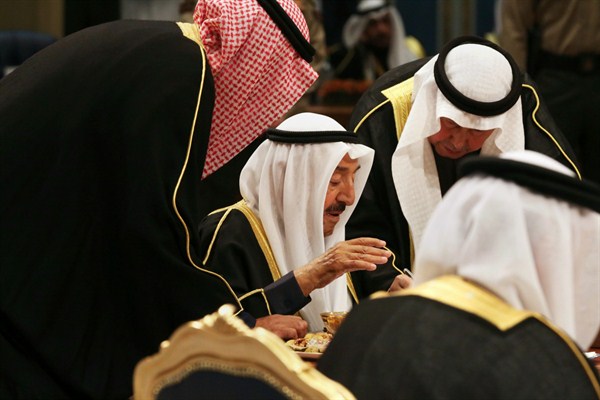The Arab countries of the Persian Gulf are in a period of unusual turbulence. It’s not their declared enemy, Iran, that is causing the trouble, but the secondary effects of overly ambitious and high-risk policy choices by a new generation of leaders from Riyadh to Abu Dhabi. Their major security partners, including the United States, are worried that regional coordination and cooperation have become harder, with each Gulf state distracted by local crises, while Russia and Iran are benefiting from the disarray. It raises longer-term concerns about the future of their regional bloc, the Gulf Cooperation Council, which has never really lived up to its name.
When Secretary of Defense James Mattis addressed Gulf leaders last week at the Manama Dialogue, an annual security summit in Bahrain, he mostly adhered to the normal rituals of U.S. relations with its Gulf allies, praising local leaders and sharply criticizing Iran. But he spoke of the need to solve internal “debates” among GCC partners—a euphemism to be sure—and called for an urgent end to the disastrous Saudi-led war in Yemen. He had quite tough words about the ruthless killing of Saudi journalist Jamal Khashoggi at the Saudi consulate in Istanbul a month ago, saying that the “failure of any one nation to adhere to international norms and the rule of law undermines regional stability at a time when it is needed most.”
Other participants at the conference brought even sharper attention to the messy realities in the Gulf. After nearly 18 months, the blockade against Qatar, also led by Saudi Arabia and its neighbors, is looking like a frozen conflict. The fallout inside the Saudi royal family from the Khashoggi murder could change the power structure there, but even if Crown Prince Mohammed bin Salman retains his vast power, the kingdom’s image has been badly tarnished. And the unwillingness of Saudi and Emirati leaders to end their military assault on Yemen has led to a turning point. The United States and the United Kingdom—the two main suppliers of arms and other military support to the Saudi-led coalition—are finally coordinating their public demands for a radical change in policy to end the war and support the United Nations’ peace process.

